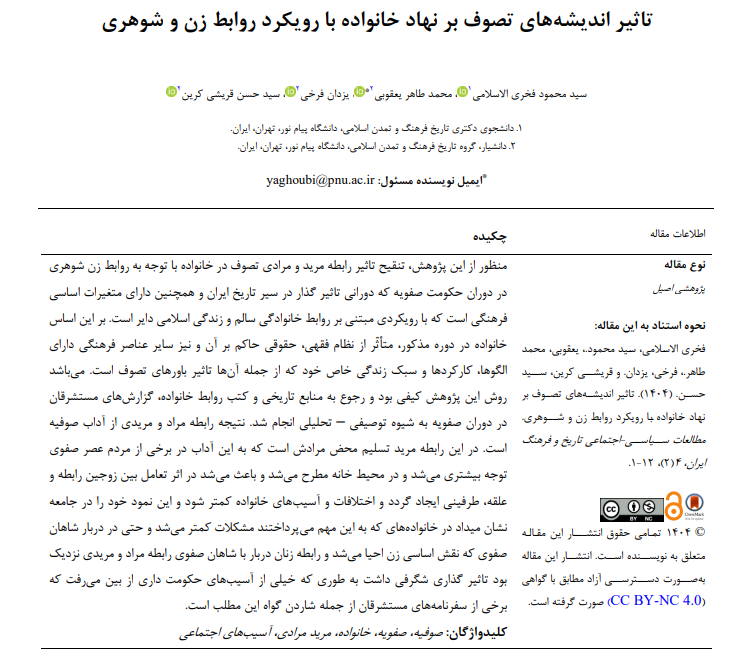The Impact of Sufi Thought on the Institution of Family: A Focus on Marital Relationships
Keywords:
Sufism, Safavid, family, disciple-master relationship, social harmsAbstract
The aim of this research is to refine the impact of the Sufi master-disciple relationship within the family, with a focus on marital relationships during the Safavid period. This era was significant in the history of Iran and also involved essential cultural variables that were based on the approach of maintaining healthy family relationships and Islamic life. In this context, families during the Safavid period were influenced by the prevailing legal and jurisprudential system as well as other cultural elements, shaping distinct patterns, functions, and lifestyles, one of which was the impact of Sufi beliefs. The research adopts a qualitative approach, drawing upon historical sources, family relationship texts, and the reports of Western scholars during the Safavid period through a descriptive-analytical method. The outcome reveals that the master-disciple relationship is a core element of Sufi practices, where the disciple is in complete submission to the master. This practice was particularly emphasized by certain people in the Safavid era and extended into the home environment. It led to the establishment of reciprocal relationships and connections between spouses, which reduced family conflicts and harms. This impact was also visible in society, as families that adhered to this principle faced fewer problems. Moreover, in the Safavid royal court, where the role of women was revitalized, the master-disciple relationship between royal women and the Shahs had a profound influence. It was so powerful that many governance-related issues were mitigated, as attested by the travel diaries of Western scholars, such as Chardin.
Downloads
References
Ahmadi Nezhad, N. (2011). On the Religious Endowments of the Safavid Period. Ketābkhāneh, Mūzeh, and Markaz-i Asnād Majlis-i Shūrā-yi Islāmī.
Esfandiari, M. R., & Molaei Birgani, S. (2017). The Philosophy of "Women and Beauty in the View of Ibn Arabi". No. 1.
Furūghī, A. (1964). The Origins of Sufism in Iran. Tehran.
Goldziher, I. (1921). Asceticism and Sufism in Islam. No Publisher.
Ibn Arabi, M. b. A. (2002). The Gnostic Treatise of Ibn Arabi. Faculty of Literature.
Ibn Arabi, M. b. A. (2009). The Meccan Revelations: Knowledge of the Secrets of Sovereignty and Royalty (Vol. 1). Translated by M. Khajavi.
Iskandari, E. (1959). The Principles of Sufism. Kānūn-i Maʿārif.
Mashkūr, M. J. (2007). The Encyclopedia of Islamic Sects. Bonyād-i Pizhūhishhā-yi Islāmī.
Mustamlī Bukhārī, I. (1984). Commentary on the Understanding of Sufism. Asātīr Press.
Patoreshfsky, I. P. (1975). Islam in Iran. Payām Press.
Ramazānī, H. (2017). The Etiquette of Devotion in the Safavid Era. Kaysan Publishing.
Zarīn Kūb, ʿ. (1969). The Record of Islam. Shirkat-i Sihāmī Intishār.

Downloads
Published
Submitted
Revised
Accepted
Issue
Section
License
Copyright (c) 2025 سید محمود فخری الاسلامی (نویسنده); محمد طاهر یعقوبی (نویسنده مسئول); یزدان فرخی , سید حسن قریشی کرین (نویسنده)

This work is licensed under a Creative Commons Attribution-NonCommercial 4.0 International License.







